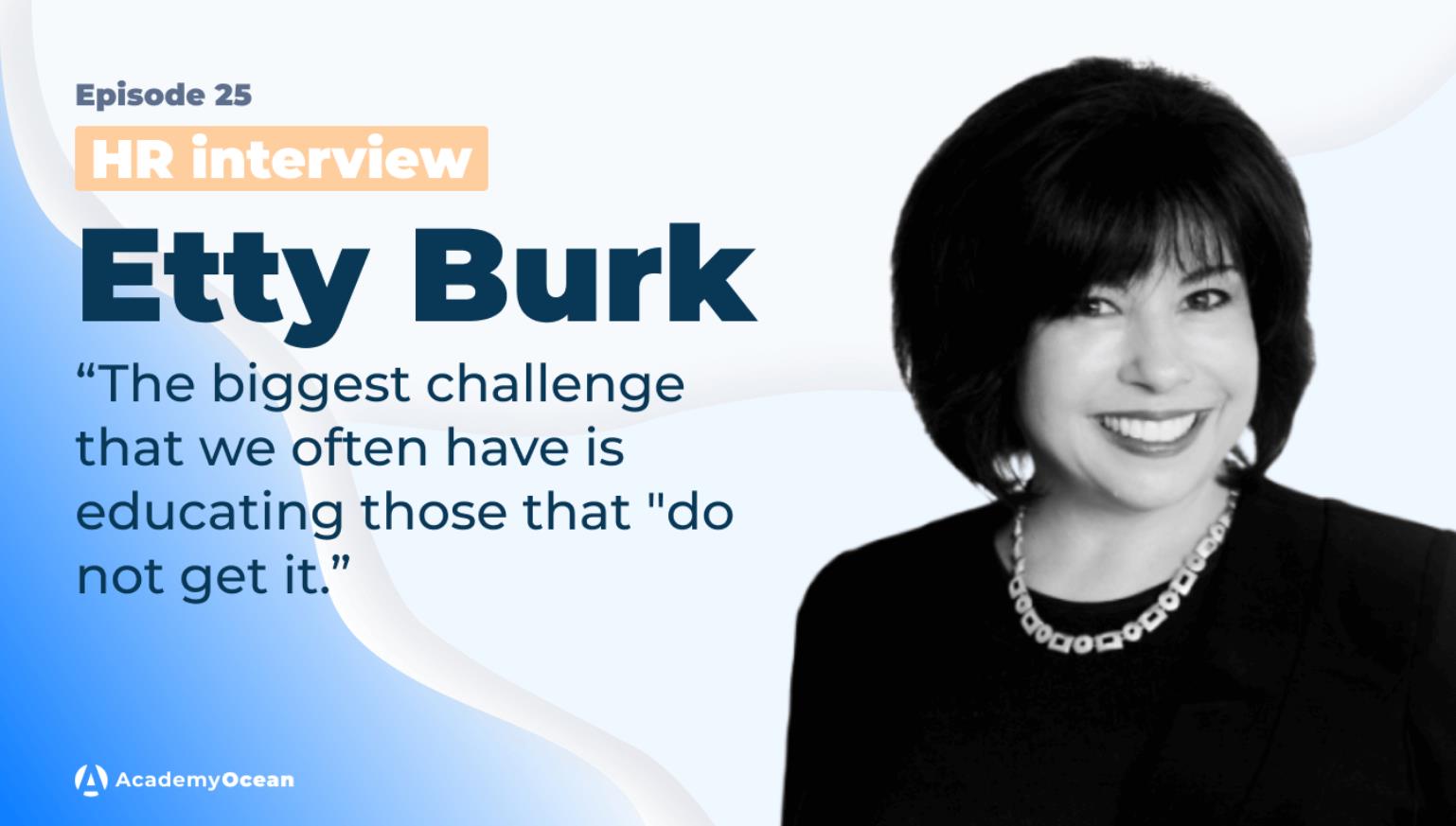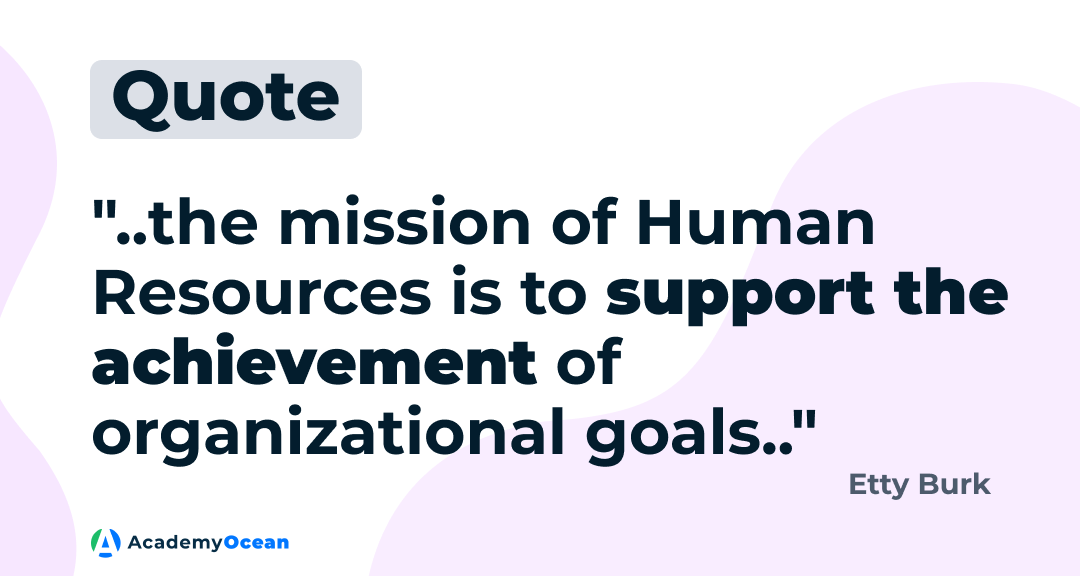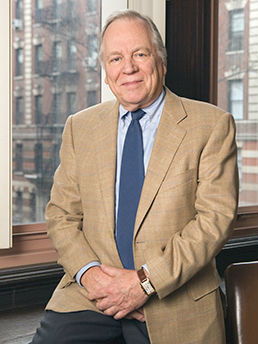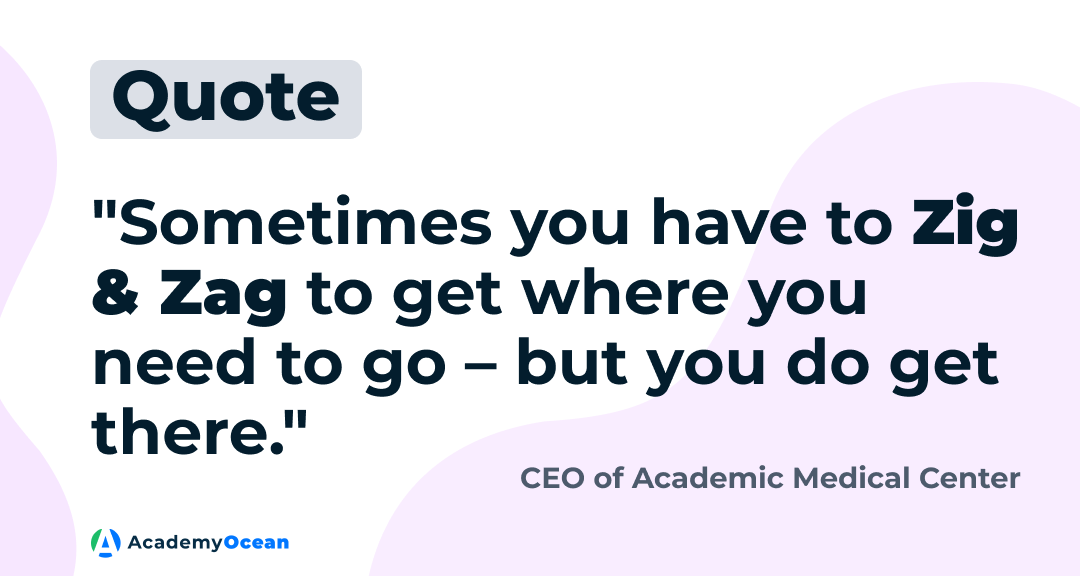Interview #25 Etty Burk: "The biggest challenge that we often have is educating those that "do not get it"

Good day, guys!
Global digitalization is changing the world beyond recognition. And HR is no exception. This is how the leading experts of the niche unanimously say that a new HR-digital trend is being formed, and with it, all HR processes are being transformed.
Models of personnel management are changing, the focus is shifting towards the formation of an HR brand and automation, HR analytics and recruitment marketing are being introduced.
We continue to collect interesting thoughts and ideas from HR experts from around the world.
Today, our guest is Etty Burk, Ph.D. Human Resources.

She translates business goals into HR, talent management, and recruitment strategies to enhance scalability and performance, and increase the competitiveness of her clients – the organization, teams, and individuals at all levels.
Etty is passionate about creating inclusive values-based cultures where individuals are respected, feel safe, and understand how they make a difference.
Driving human capital transformation (HR) from within energizes people and increases organizational competitiveness.
She partners with clients to develop and implement transformational change management strategies that align business goals with people, systems, and processes to ensure that performance at the organization, team & individual levels are enhanced.
Etty has developed the HR Talent Management model. Analyze it below.

AO: Hello Etty and welcome to our AcademyOcean studio😊
We would like to start the interview with a question about your professional development.
Did you work somewhere before becoming an HR professional? Why did you decide to become an HR?
E: As an organizational psychologist by training, I have always been passionate about creating inclusive environments where employees are respected and understand how they make a difference. Employees that feel valued are more connected to their organizations. Organizations with connected employees do better financially, are more productive, and have happier customers – A win-win for both employees and organizations!
Over time, I began to gravitate towards the People function – I believe that HR facilitates business success by aligning processes, people, and culture with business goals and strategy. I felt strongly that this was a place in the organization where I could make a real difference.
AO: Can you share your thoughts on why HR is an essential function in any organization?
E: Businesses can't do anything without having the right people in the right place, at the right time. As we know, the mission of Human Resources is to support the achievement of organizational goals by ensuring that relevant and innovative people policies, practices, and systems are in place, provided so that the organization can attract, retain, and develop outstanding staff that is a source of sustainable, competitive advantage.
Businesses will only sustain their growth and success long term when HR is aligned with the company and not just an afterthought. Unfortunately, we have seen what happens when HR and HR issues are not taken seriously.

AO: Etty, time does not stand still. Everything is developing at lightning speed. Where do you see the HR industry in the next five years?
E: The People and Culture function will be crucial in helping the organization answer these two questions:
1. What does the organization need from its people to achieve its goals and actualize its mission?
2. What do people need to be successful in the organization?
The COVID pandemic continues to shake up and disrupt our sense of work and connection and has brought a sense of isolation to many of us. Work-life balance stress is also a huge challenge when we realize that some of us have stopped "working from home" but are actually "living at work." Supporting remote workers (and all workers) with increased mental health resources and providing support to help employees with better work-life balance will not only be critical but essential.
The pandemic also challenged our assumptions about which roles can work from home successfully. We will see a more hybrid approach to work even when the pandemic is under control. With more people potentially working at least some days a week from home, many questions need to be addressed, which include: How will the organization support home offices? How will the organizations deal with security? What technology is needed to make that happen? How do we attract, hire, develop, reward, and manage performance in this new reality? What are essential manager skills in this new way of working?

With more people working from home and increasing technology support, I also think that we should see an increase in hiring those who cannot easily commute due to family situations or disabilities.
There will also be an increased focus on sustaining and reinforcing a consistent and positive employee experience and organizational culture. Improved programs and more sophisticated AI technology will be developed to supplement employees from wherever they are to connect, feel valued and safe, focus on development, share information and data, and provide their needed input.
I am excited to see HR in five years with all the potential AI and technology advances that will create a seamless and less biased HR practice.
AO: Absolutely agree with you, according to BBC, after the COVID-19 pandemic the numbers of new job opportunities is very low in many countries. Some experts have warned it could be years before levels of employment return to those seen before the pandemic.
What difficulties do you usually face working as an HR specialist?
E: People often undermine what they do not understand or do not know. The biggest challenge that we often have is educating those that "do not get it". Our responsibility is to help the organization's leaders and all our clients understand the positive impact of getting HR right or the detrimental effects that occur when they get HR wrong. Our responsibility is to help and educate the organization leaders to understand how HR can genuinely benefit the organization when allowed to operate and contribute at a strategic level.
I worked with a senior operations leader who was surprised when he received business strategies and programs that some leaders developed without any thought of whether the organization has the right people to implement the strategy or roll out the plan successfully. He always said that the best way to kill a business strategy is to include the People function as an afterthought and not as an integral part of the plan from the beginning!

AO: Etty, can you name three areas that you feel need the most improvement, based on your understanding of standard HR practices?
E: True Inclusion and Diversity: We have come a long way, but we need to do more to create an environment where we can celebrate all differences and leverage all talents!
More emphasis on real Employee Engagement and creating a culture where all feel connected to the organization, safe and respected, and understand how they make a difference. Employee Engagement is not a program. It is an integrative and synergistic approach to how we lead at all levels of the organization. We need to develop managers/leaders at all levels to have the skills and resources to lead with vision and values.
Smarter Technology to increase the effectiveness and efficiencies of HR. Improved technology will allow a seamless approach to connecting with people, sharing information, and better people analytics that ties to business needs.
AO: Duly noted!
According to Quantumworkplace, 48% of employees believe that respect is the most essential factor for a culture of inclusion and 61% of employees believe diversity and inclusion strategies are beneficial and essential.
Can you name one (or several) HR experts whose work do you highly appreciate or take as an example?

E: Warner Burke, Ph.D., was my advisor and mentor. He guided me through my Doctoral program. I was privileged to be invited to work in his firm that focused on Organization Assessments, Culture, and Management Practices.
He guided the development of my customer-focused approach and taught me about patience, working with clients, to listen to what is being communicated (even without words). I am forever grateful!
AO: Etty, let's move to the topic of the adaptation process for newcomers.
How does the onboarding of new employees go into your company?
E: The term "onboarding" often refers to integrating and orienting new employees into the organization, preparing them to succeed at their job, and becoming fully engaged, productive members of the organization. Our goal is to create a welcoming and motivating new employee onboarding experience to quickly and seamlessly transition new colleagues into their role, team, the company, and the industry.

How to train Customer Success & Service teams and achieve stunning results
AO: And what about traditions? What traditions your company has, and what is your favorite one?
E: One of my favorite traditions has been eating together as a team and using that time for great discussions and fun games.
Another tradition is rotating the facilitator and note taker's role at standing meetings. All participants at the standing meeting eventually experience what it takes to be in these roles. It is an excellent way for employees to learn the art of meetings, setting agendas that work, inviting the right people, and the necessity of having accurate minutes. This tradition allows for professional development and increases the appreciation for those in these roles!
AO: Etty, What is the most valuable professional development advice you have ever gotten?
E: I worked with a CEO in an Academic Medical Center, and they had a refreshing perspective on how to deal with challenging goals or obstacles. She used to say, "sometimes you have to Zig & Zag to get where you need to go – but you do get there." She also said when you feel blocked, pretend that you are water and figure out where the holes are and find a way to get in – I always remind myself of their meaningful insights when things get challenging.

I want to share a personal story that had great learnings. Years ago, I was learning how to ski out west. After one of the ski lessons, I ventured on a black diamond trail, and I was determined to control myself down the steep mountain. I was incredibly proud that I did not wipe out and went over to my instructor to let him know. His response stays with me until today, "Etty, that's too bad that you did not fall. It means that you did not try hard enough." His words remind me to remember to take responsible risks and move out of my comfort zones to grow and create!
AO: A very cautionary tale!
The next question is a bit extraordinary. If the company you work on now were a person, what kind of person would it be?
E: Fun Question! I am very grateful to have worked in various industries and have had the opportunity to work in for-profit, not-for-profit, private, and public organizations. My current clients are usually early-stage PE-backed, small to mid-size organizations going through growth and transformation. I think that if they were a person, they would be very passionate and visionary. They would have excellent influence skills, be driven, be very caffeinated, and probably not wear socks. They would also be intense, health-conscious, and vegan. They would be demanding and have high standards, financially driven, have superior excel skills and engineering expertise.
AO: Etty, let's talk about the current year. What types of tools do you think every HR should be using in 2021?
E: The tools would include Organizational development, project and change management, mental health, data management, strategic thinking, and visioning. I will stop now since every time I read the list, I add more.
AO: And what HR trends do you think will emerge in 2021?
E: All of HR will be important, but certain areas may need to be redefined. I think that the trends will focus on how to deal with remote work and redefine what is "an office, how to connect people in a remote or hybrid environment, the use of more or different technology, mental health support, and how to develop a sense of team and culture.
AO: Well, thanks for your detailed answers and let's finish our interview with a relaxing question.
What was the funniest/most unusual incident during your HR practice?
E: I was working at a publically traded organization with a long and dignified history. At a meeting with the CEO and direct reports, they all begin talking about retiring. I innocently asked them about their succession plans, and there was complete silence. They looked at me with total confusion and shock. I quickly assessed the situation and told them a story.
"Pretend that you all owned a sports team. You met with the coach and asked them how your team was doing? And they answered – 'They are doing great'! Then you begin to ask about individual players and how are they doing? The coach answered, 'All is great!' You then ask about that plans in place for when a player gets injured or leaves, and the coach answers, 'Don't worry, trust me. We will wing it!' Then I asked them what do you think the owner of the team should do to that coach? They all answered that they should fire the coach."
This analogy helped them understand that they have a business and fiscal responsibility to the shareholders and the employees to have formal succession plans for planned and unplanned transitions. They ended up being the biggest supporters of this initiative!
Essentials of a Successful Team
AO: Nice story, Etty. Thanks a lot for your time and for such an inspiring interview. We wish you all the best in your career!
That's all for today, friends. See you at the next interview!
In case you would like to ask your own questions, write them down in the comments. Also, if you want to read an interview with a particular person, let us know.
Learn more about LMS 2.0 Platform for employee training.
If you want to learn more about the HR field and find a lot of useful content, join the most secret HR group.
Take care 😇